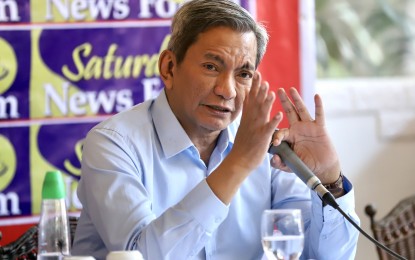
INVESTOR CONFIDENCE. Albay 2nd District Rep. Joey Salceda maintains that introducing amendments to the economic provisions of the 1987 Constitution is crucial in boosting investors’ confidence. One of the guests at the Saturday News Forum in Quezon City on Jan. 27, 2024, the chairperson of the House Committee on Ways and Means said the faster the legislators can complete the process of Charter change, the better it will be for the economy. (PNA photo by Robert Oswald P. Alfiler)
MANILA – Introducing amendments to the economic provisions of the 1987 Constitution is crucial in boosting investors’ confidence in the country, Albay 2nd District Rep. Joey Salceda said on Saturday.
Salceda said he agrees with Socioeconomic Planning Secretary Arsenio Balisacan that “unnecessary restrictions” in the constitution should be eliminated to entice more foreign investors.
During the Saturday News Forum in Quezon City, Salceda said constitutional reforms will help spur economic growth.
“I agree with Balisacan that faster Cha-cha (Charter change) is better for investors’ certainty,” the chairperson of the House Committee on Ways and Means said.
“The faster the legislators can complete the process of Charter Change, the better it will be for the economy.”
Salceda stressed that under the House proposals, the economic provisions of the constitution will be expanded to attract more foreign investments.
He said there is a “zero chance” that foreign investors will cease their operations in the country, once the constitutional reforms have been made.
“One, we commit to expanding, not restricting the scope of the economy that is open to foreign investment. Two, we commit to making investing in the Philippine easier and not harder so we will impose no new regulatory restriction in areas that are already open,” Salceda said.
Salceda added that House lawmakers would make sure that the proposed economic revisions would not cause uncertainty among investors.
“Unlike other reforms where there is a rationalization of existing incentives or benefits, this one will not take away any existing investors’ rights or privileges. This will expand them,” he said.
In a Palace press briefing on Friday, Balisacan expressed support for Cha-cha to give the country a better chance of attracting foreign investments.
Balisacan said constitutional restrictions on foreign investments are seen as “impediments” to the country’s economic progress.
He also hoped that the Senate and the House of Representatives would have a “common position” on Cha-cha.
Steady growth
Meanwhile, Salceda said the country has good prospects in attaining 6.5 to 7.5 percent full-year gross domestic product growth rate this year because of its strong agriculture, industry and services sectors which fuel growth.
“Mukhang services pa rin po kasi mayroon pa tayong comparative advantage lalung-lalo na sa mga BPO (Business Process Outsourcing), call centers… ay hindi pa po talaga nalalampasan tayo ng mga kalaban natin, kakumpetensiya natin (The services sector is still our comparative advantage, especially in BPO, call centers. We’re unbeatable there),” Salceda said.
In terms of agriculture, Salceda said prospects are also looking up because of Secretary Francisco Tiu Laurel Jr., who has a strong grasp of the industry.
“Lalung-lalo na ‘pag sa agriculture galing ang growth, may ginhawa po iyan pagdating sa poverty dahil nga po ang poverty natin, karamihan ay dahil po mataas ang presyo ng kinakain at ang lowest 30 percent ng ating ekonomiya. Ang kanila pong kinakain ay 60 percent ay galing po sa agriculture (When growth is rooted in agriculture, progress will follow because poverty usually starts when the prices of food are high. Sixty percent of food consumption comes from agriculture),” Salceda pointed out. (With reports from PND/PNA)
